A top aide to Russian President Vladimir Putin warned that a “global famine” may start by the end of 2022 because of grain shortages caused by the conflict in Ukraine.
“It is important that in the conditions, for example, of a global famine that will occur closer to autumn, by the end of this year all over the world, Russia should not suffer, but be fully provided with food,” Maxim Oreshkin, Putin’s adviser, told a forum in Moscow late last week, according to state-run media RT.
Oreshkin said the famine will be, in part, caused by the United States’ monetary policy.

“Until about 2020, wheat prices on the world market were stable, but following the increased printing of the dollar, which started around July 2020, prices started rising sharply,” he said, referring to Washington’s measures to deal with effect of COVID-19-related lockdown policies.
“In fact, what America is trying to do with Ukraine now is to take out the grain reserves that Ukraine currently has in its possession—just another action that dooms Ukraine to serious humanitarian problems, but also dooms the global community to having big problems with hunger,” Oreshkin warned.
Meanwhile, according to the aide, Russia has actively prepared for a possible grain shortage, according to the AFP news agency.
“Russia is actively preparing for a global famine; it started at the end of last year,” he asserted.
However, U.S. Secretary of State Antony Blinken last week accused Moscow of blocking Ukrainian ports with warships, saying Russia is using food as a weapon of war.

“The Russian government seems to think that using food as a weapon will help accomplish what its invasion has not … to break the spirit of the Ukrainian people,” Blinken told the U.N. Security Council on May 19. “As a result of the Russian government’s actions, some 20 million tons of grain sit unused in Ukrainian silos,” he added.
Last week, wheat prices hit a historic high after India—the second-largest producer of the grain—said it would block exporting wheat. After India’s announcement, the price of wheat futures rose by 5.9 percent on May 16 to an all-time high of $12.68 per bushel.
Both Russia and Ukraine, meanwhile, account for about a third of total wheat supplies. Ukraine is also a significant exporter of barley, corn, sunflower oil, and canola oil.
Blinken also rejected Russian claims that U.S. economic sanctions against Russia were to blame for the spike in prices.
“Sanctions imposed by the United States and many other countries deliberately include carve-outs for food, for fertilizer, and seeds from Russia,” he said. “The decision to weaponize food is Moscow’s and Moscow’s alone.”
From The Epoch Times

